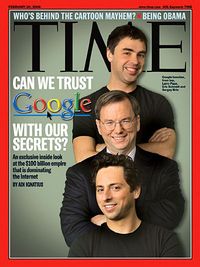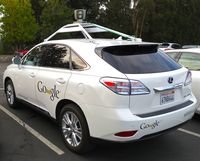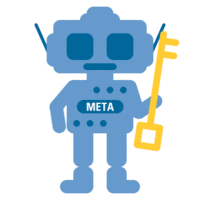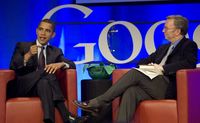
Google has already destroyed more business models than the Great Depression, and it is poised to destroy many more. This latest move on Google was thus inevitable. Google has helped destroy the newspaper business model and it’s going after television. Google has helped destroy millions of middlemen, of all types, around the world.
It is more accurate to say that the Internet, and not Google, has enabled this. But Google remains the target because it’s the dominant player in that business.
Now Google autonomous cars are prepared to destroy millions more jobs. Jobs driving cars, and jobs selling car insurance. Jobs selling cars, jobs selling car parts, and jobs parking cars.
Google is not prepared for the political pushback it is generating.

To many, many people this is a threat. Rapid technological change of this sort has been a threat since the 18th century. But history teaches it is also an opportunity. What has to happen is for demand to be recycled. People should be making enough money to afford a good meal out, to afford a yoga session, to afford a nice massage. Not just American people, either. There are all sorts of jobs that result from this –people serving people – jobs people like to do, that people enjoy having done for them, and that should now be worth what they cost because, in the end money is supposed to serve people.

The battle takes many forms. One form is lobbying, by people like Scott Cleland, who has transformed himself over the last years from a professional Bell-defender to a professional Google-basher. (Maybe they’re the same thing.) He wants Google treated as a phone company, and phone companies treated less like phone companies, with government control used to benefit Hollywood and other old-line interest groups.
In Europe, with its long tradition of government controlling business, the threat is more serious. (In Asia, which for the most part has never enjoyed real democracy or real capitalism, the threat is existential.) Much of the activity in Europe concerns the so-called “right to be forgotten,” which is in fact the right of government to censor the medium on behalf of private parties. So far, Google has resisted all efforts to apply right to be forgotten to Google.Com defying France, and has defied British attempts to censor news about the controversy.

It all accelerated this week with the publication of a study by Robert Epstein, showing that when he manipulated search results, people were manipulated. Also, water is wet. But he turned this into a charge that “Google could rig the 2016 election,” and that Google did indeed rig India’s recent election, because more people did searches on the name of the election’s winner than on his opponents.
This is pseudo-science. You start with a conclusion, create an experiment that can only reach said conclusion, then draw inferences aimed at collecting more money for your “institute” and directing politicians where you want them to go. It is what it attacks.
Google, and the Internet, are the steam engine of our time. They are creating change, and they are accelerating change. As a result they are threats to existing interests, to existing jobs, and to political “order.” These threats are going to accelerate with the Internet of Things, with self-driving cars, with robotic factories and drone warfare.
What are people supposed to do in the face of all this? The first thing is to realize that people are still in charge. The second thing is to realize that the problem of capitalism lies in its inability to recycle gains to the mass of the people capitalism claims to serve. It’s not that technology isn’t serving people properly, and becoming our masters. It’s that capitalism is not recycling the gains of technology into peoples’ hands quickly enough.

The economic and political forces arrayed against Google do not accept this. Hollywood – in the form of its studios – has been conservative since the industry’s founding. That’s why it left for California in the first place, to get away from its obligations under Edison’s patents, to get away from labor unions, to create a Randian paradise it could fully control. Old-line journalism, in the form of newspapers and TV, is wedded to the same system.

Given a choice between old-style industries on the one hand and new-style industries on the other, between a politics that protects old jobs and one that encourages the creation of new ones, I know what side I stand on. The only question, for me, is whether Google will support enough redistribution of wealth, in its own self-interest, to give society the stability needed to avoid another war.
Because if people like those behind Donald Trump get their hands on this economy, we may indeed see a replay of the 1930s. All of it. And god save our children if that happens.









